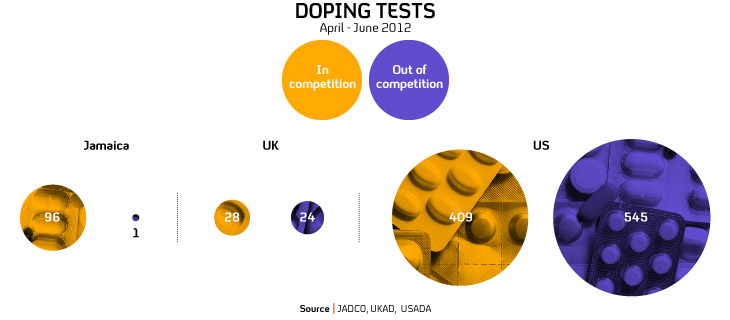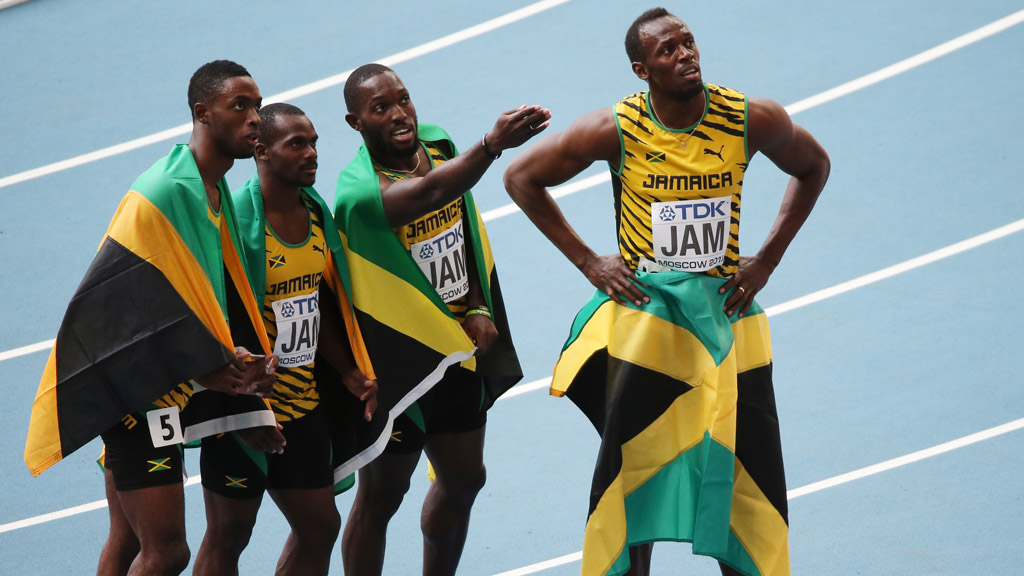‘Sprint factory’ Jamaica under fire over drug testing regime
Jamaica is coming under pressure to improve its anti-doping regime after a series of positive drugs tests by its athletes highlighted a catalogue of failures.
The World Anti-Doping Agency called on the island nation’s government to urgently address claims by the former executive director of the Jamaica Anti-Doping Commission that its drugs-testing programme was completely inadequate.
The revelations included claims that just one athlete was randomly tested outside of competition in the five months leading up to the London 2012 Olympics.
Earlier this month Renee Anne Shirley, the former executive director of the Jamaica Anti-Doping Commission (JADCO) described a recent spate of positive tests by Jamaican athletes as “the equivalent of a category-5 hurricane crossing directly over the island”.
‘Sprint factory’
In an article for Sports Illustrated, Ms Shirley said that the world’s pre-eminent sprint factory “needs a world-class anti-doping operation to go with its achievements on the track”.
Ms Shirley, who left JADCO earlier this year, said the scandal represented the disaster “that I hoped would not visit Jamaica, even as I feared that it would”.
She claimed that in the five months leading up to the London 2012 games only one out-of-competition test had been conducted by JADCO, compared with 96 in-competition tests.
Ms Shirley said that the current program -while improved -“makes a mockery of Jamaica’s posturing and flames suspicion more than it douses it”.
She blamed limited staffing resources for the problems, with only one member of staff in charge of keeping track of athletes so that they could be tested out of competition.
A statement by WADA said: “Where there are issues relating to any anti-doping program, WADA’s role is to work closely with that signatory to remedy the situation.
“If, consequently, no suggested or recommended remedial action is taken, a report would be made to the WADA Foundation Board where a signatory can be declared non compliant with the World Anti-Doping Code.
“No other sanction can be taken by WADA, but non compliant decisions are reported to relevant sporting and governmental bodies to decide on further course of action.”

Jamaican men won four of the six medals available in 100 and 200-meter races at the recent Athletics World Championship in Moscow and took gold in the 4×100-meter relay.
Track triumphs
Jamaica’s Shelly-Ann Fraser-Pryce won the 100 and 200, and the Jamaican women triumphed in the 4×100-metre relay.
But the Jamaican team attracted negative headlines when five athletes failed doping tests over the summer.
Jamaica’s Asafa Powell, who once claimed that drugs cheats should be jailed, and Sherone Simpson were among the five.
Powell and Simpson have both attributed their failed test to unwittingly taking supplements that contained banned ingredients.
Just weeks earlier Veronica Campbell-Brown, a three time Olympic gold medallist, tested positive for a banned substance.

Jamaican athletics’ biggest star, the 100 and 200 metre world record holder Usain Bolt (right), who has repeatedly denied any involvement in doping, was recently asked about the latest doping scandal in sport.
Bolt gave his reaction to his teammates’ positive tests just after the news broke in a press conference at July’s anniversary games in London , which was dominated with questions about doping.
While Bolt declined to pre-empt the outcome of the testing process, he stressed his own consistent track record and the fact he was posting record breaking times since the age of 15.
I just go along with it because it is the rules, Usain Bolt
“I was always going to be great,” he told reporters.
“I got tested, the day before yesterday, I think,” he said. “For me it is part of the routine, we get tested all the time randomly. I just go along with it because it is the rules.”
The latest round of positive tests have raised questions about the Caribbean nation’s testing programme, which was criticised by former Olympic champion Carl Lewis in 2008 for its lack of randomised out-of-competition tests.
Dietary supplements
More recently, the country was criticised for not providing annual drug testing statistics, by Victor Conte, the doctor behind the BALCO designer drug scandal in 2003.
Ms Shirley said that during her time with JADCO, she voiced concern about internet purchases of drugs and supplements by athletes,adding “there is reason to believe that some Jamaican athletes have been careless in their Internet purchases of dietary supplements”.
She said she had also urged authorities to get serious about anti-doping before a scandal hit Jamaican athletes.
“But despite my efforts I could not get any member of the JADCO board or member of Jamaica’s Cabinet to take it seriously,” she said. “They believe that Jamaica does not have a problem.”




